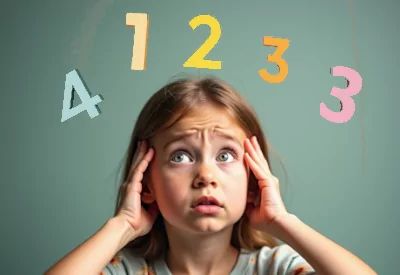A Gentle Approach with Homeopathy
Dyscalculia is a learning disorder that affects a child’s ability to understand and work with numbers. It can make tasks like counting, solving math problems, and understanding mathematical concepts challenging. While dyscalculia is not related to intelligence, it can impact a child’s academic performance and self-esteem. Homeopathy offers a gentle and holistic approach to managing dyscalculia, focusing on improving cognitive function, emotional well-being, and overall learning abilities.

Understanding Dyscalculia in Children:
Dyscalculia manifests differently in each child, but common symptoms include:
- Difficulty with numbers: Struggling to recognize numbers, count, or perform basic arithmetic.
- Poor math skills: Trouble understanding mathematical concepts, solving problems, or remembering formulas.
- Time and measurement challenges: Difficulty telling time, understanding sequences, or measuring quantities.
- Memory issues: Trouble remembering numbers, steps in a problem, or mathematical facts.
- Emotional struggles: Frustration, anxiety, and low self-esteem related to math performance.
Homeopathy’s Role in Supporting Children with Dyscalculia:
Homeopathy takes a holistic approach to dyscalculia, addressing the child’s cognitive, emotional, and physical well-being. A qualified homeopath will assess the child’s specific symptoms, learning challenges, and overall constitution to recommend individualized remedies. This approach aims to:
- Enhance cognitive function: Improve memory, focus, and information processing.
- Boost math skills: Support understanding of numbers, problem-solving, and mathematical concepts.
- Promote emotional balance: Reduce anxiety, frustration, and low self-esteem.
- Strengthen overall well-being: Enhance the child’s ability to cope with academic challenges.
Common Homeopathic Remedies for Dyscalculia (General Information Only):
This is not a recommendation for self-treatment. A qualified homeopathic practitioner should select remedies only after a thorough assessment. Some remedies that may be considered (but are not limited to) include:
- Baryta carbonica: Often used for children with delayed learning, especially in math and problem-solving.
- Calcarea phosphorica: May support cognitive development and improve memory.
- Lycopodium: Useful for children who struggle with confidence and fear of failure.
- Phosphorus: Often considered for children with vivid imaginations but difficulty focusing on tasks.
- Anacardium orientale: May help with memory issues and lack of concentration.
Important Considerations:
- Professional Consultation: Self-managing dyscalculia with homeopathy is not recommended. Always consult a qualified homeopathic practitioner for a personalized treatment plan.
- Complementary Therapies: Homeopathy can work alongside educational interventions, tutoring, and specialized math programs.
- Individualized Approach: Each child with dyscalculia is unique, and homeopathic treatment is tailored to their specific needs.
- Patience and Consistency: Homeopathy works gradually, and consistent follow-ups with the practitioner are essential for long-term benefits.
- Conventional Care: Homeopathy should complement, not replace, conventional educational support or therapies recommended by specialists.
Homeopathy offers a gentle and individualized approach to supporting children with dyscalculia, addressing their unique challenges and enhancing their overall well-being. However, it’s essential to seek professional guidance from a qualified homeopathic practitioner and work closely with educators and other healthcare providers to ensure a comprehensive care plan.

